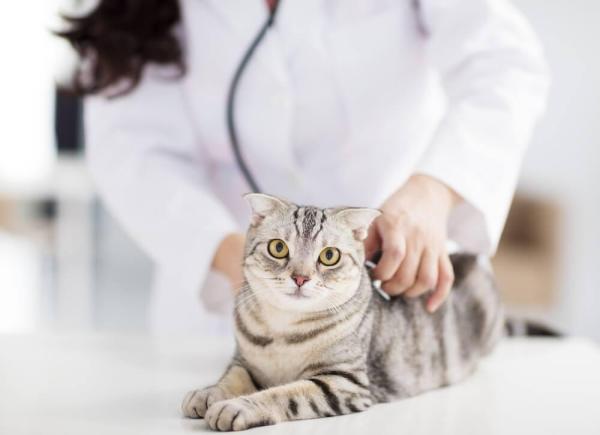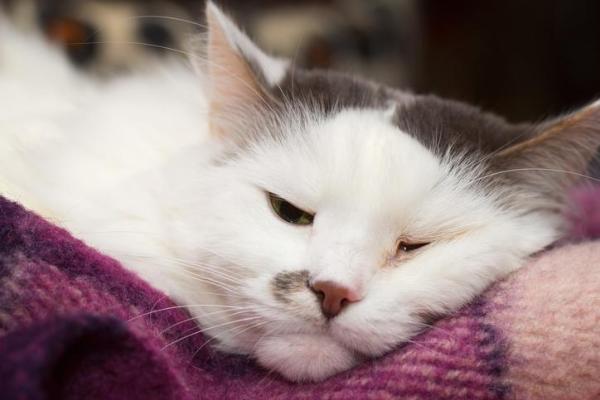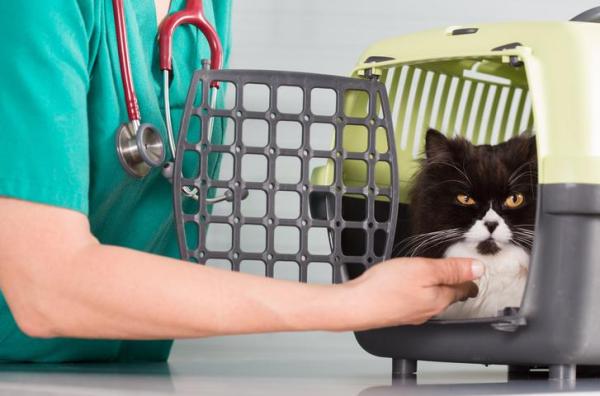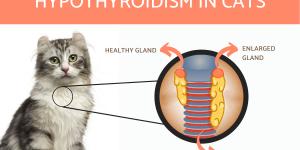Causes of Kidney Problems in Cats



See files for Cats
Kidney problems in cats are relatively common disorders in cats, especially with older cats. As caregivers, it is very important we pay attention to any physical or behavioral changes in our cat. Unfortunately, the early stages of kidney problems in cats can have very few symptoms or even be asymptomatic. It might only be when the disease has progressed and renal failure has begun that we notice any significant change. This is only one of the reasons regular veterinary checkups are so important.
While we cannot diagnose types of feline kidney disease, AnimalWised provides the most common causes of kidney problems in cats. If you think you see any of the symptoms of kidney disease in your cat, remember to take them to a veterinarian immediately.
The role of the kidneys in cats
As with all vertebrate animals, a cat's kidneys are vital organs which perform various functions. They are perhaps best known as part of the digestive system as they are important filtration units in the cat's body. However, these organs are also part of other vital bodily systems. Although they may have others, the main functions of a cat's kidneys are the following:
- Remove waste: when a cat eats food, they metabolize it in their body to take in the nutrients they need to survive. Not all the content of their food is useful, so the kidneys help to remove the part of the food which is not needed and excretes it from the body.
- Removes toxins: sometimes there are toxins which enter the body, either via ingestion, skin absorption, inhalation or other routes. The kidneys filter these toxins, the health of the kidneys often determining how well this occurs.
- Controls water balance: when blood is filtered in the kidneys, they monitor the cat's state of hydration and helps to address the balance.
- Controls blood pressure: they are able to do so thanks to the production of hormones such as renin.
- Vitamin D: activates the release of vitamin D from food and the sun, something which has many benefits including the renal excretion of calcium and phosphorous.
- Red blood cells: the kidneys help in the production of red blood cells thanks to their ability to produce the hormone erythropoietin.
- Electrolytes: helps balance the cat's electrolytes.
Since the kidneys are important for filtration, their impairment will result in the buildup of toxins. This can lead to renal failure and various kidney problems in cats, but the toxins will also cause damage to other parts of the cat's organism. When the damage is sufficiently extensive, renal failure will result in the death of the cat.
Bacterial infection (pyelonephritis)
Pyelonephritis is a general term for inflammation of the kidneys, but it is often the result of an acute bacterial infection. These kidney problems in cats are usually due to lower urinary tract infections, with the bacterial pathogen traveling from the bladder to the kidneys via the urinary tract. These bacteria are most commonly E. coli or Staphylococcus.
Along with pyelonephritis, there are various types of feline lower urinary tract disease (FLUTD). These can be associated with certain risk factors including urinary stones, taking certain medications and diabetes in cats. If our cat has a bacterial infection in the kidneys, they are likely to exhibit the following symptoms:
- Polyuria (increased urination)
- Loss of appetite
- Drinking more water
- Loss of energy
- Sunken eyes
- Loss of skin turgor (skin elasticity)
- Vomiting
- Diarrhea
- Ammonia smell on breath
Bacterial infections not only harm the kidneys, but they can spread to other parts of the body and cause the cat's entire organism to shut down. It is very important we take a cat to the veterinarian if we witness any of these symptoms. They will be able to administer treatment which will include antibiotics to treat the specific bacteria and symptom management to reduce the renal damage in the feline. Temporary or permanent dietary changes may also be required.

Feline infectious periotnitis
Bacterial infections are not the only type of infection which can affect the kidneys and result in renal failure. Feline infectious peritonitis (FIP) is a disease which is caused by feline coronavirus (FCoV). The peritonitis is a result of the cat's immune system failing to combat the coronavirus.
Not all cats infected with coronavirus will develop FIP, but those with a lowered immune system or genetic predisposition are more likely to develop this kidney problem in cats. Although the pathogenesis of FIP is not well understood, it is believed to be a result of white blood cell mutations in many cases. Feline infectious peritonitis can be either wet or dry:
- Effusive FIP (wet): is associated with the accumulation of fluid in the cat's abdominal or chest cavity. This can put pressure on various organs, including the lungs. This means cats with wet FIP may have troubled breathing.
- Non-effusive FIP (dry): no fluid accumulation, but they will have various clinical signs including weakness, weight loss, diarrhea and jaundice.
Diagnosis will be carried out by veterinary examination. Ocular changes can suggest FIP to a vet, but they will need to carry out various tests since many of the symptoms are generalized. This means they can be the result of various disorders. As a viral disease, treatment is not usually direct. Anti-viral medication may be used, but the cat will mainly need symptom management and immunity boosting to help them overcome the virus.
Polycystic kidney disease
This is a kidney problem in cats with a hereditary cause. Cysts form on the kidney in utero and fill with fluid. The problem may be asymptomatic for years, but as the kittens develop into adult cats the cysts can increase in size and become more problematic. For this reason, polycystic kidney disease (PKD) in cats is not usually diagnosed until after the cat reaches 7 years of age.
The autosomal dominant gene which causes PKD in cats is present in certain breeds. The most commonly affected breeds are types of Persian cats and their related breeds, such as the Exotic Shorthair. The symptoms are only produced in an acute presentation, although damage may occur over a prolonged period. In this case, we may see a gradual deterioration. Common symptoms of PKD in cats include:
- Polyuria (increased urination)
- Polydipsia (increased water intake)
- Weight loss
- Poor coat condition
- Alopecia (hair loss)
- Dehydration despite consuming water
- Vomiting
- Diarrhea
- Ammonia smell on breath
If the cat does not receive veterinary attention, it can worsen. When cats have untreated kidney problems, it can result in chronic kidney disease (CDC) in cats. This is a form of renal failure which needs constant management to prevent complete organ failure and the death of the cat.
Uroliths (urinary stones)
Uroliths can form in various parts of a cat's urinary system. These are due to a buildup of mineral deposits which can cause physical blockages. When they are sufficiently small, they will eventually be excreted in the cat's urine. We may be able to see crystals in the cat's urine as a result of uroliths.
While the direct cause of kidney stones in cats is the build up of minerals (most commonly calcium), they can be related to various disorders. These can include bacterial infection, hereditary propensity or even certain blood disorders. While they are not usually a dangerous condition, they can result in hydronephrosis, i.e. an enlargement of the kidney.
Fortunately, kidney stones are not one of the most common kidney problems in cats. Even if uroliths do develop in the kidneys, they will often pass on to other parts of the urinary tract. It is only when the kidney stones are sufficiently large to cause inflammation or blockage. In these cases, surgical intervention may be required to remove the stones.
Parasites
There are various pathogenic parasites which can infest a cat and cause kidney problems. Internal parasites of felines commonly affect the gastrointestinal system, including the kidneys. Certain parasites can be absorbed from the intestines and then travel to the kidneys. In these cases, they will be considered a parasitic infection.
Certain common parasitic infections include:
- Toxoplasmosis
- Heartworm
- Tapeworm
- Hookworm
Not all of these parasites will directly affect the kidneys, but they can cause kidney problems due to their systemic effects. It is vital we take the cat to a veterinarian to determine the type and location of the parasite. In doing so, they can provide the right type of deworming treatment to kill the parasites. While internal parasites are commonly the problem, external parasites in cats such as ticks can also result in kidney damage.

Poisoning and intoxication
When a cat ingests, inhales or even absorbs something toxic, it can result in kidney failure. If they eat something they shouldn't, toxins can be absorbed into the intestines where they are to be processed by the kidneys. Although the kidneys should filter out the toxins, if they are too strong or in too large a quantity, they can cause irreparable damage.
When the toxins enter the cat's organism, it can result in various symptoms:
- Lethargy
- Shallow breathing
- Bloody discharge
- Inability to move
- Hypersalivation
- Vomiting
- Diarrhea
Cats can ingest various toxic substances. These can include harmful chemicals present in the home, such as with cleaning products. Others may be less obvious. For example, there are different plants that are toxic to cats, even if they do not cause us any problems.
When the intoxication of the cat has progressed sufficiently, it will result in the cat going into toxic shock this is life threatening and is considered a veterinary emergency. If you think your cat may have been poisoned, contact the veterinarian immediately. They will likely begin with fluid therapy to flush out the toxins and return kidney function. Sometimes the renal damage will be permanent.
Kidney disease is one of the most common health problems in felines. Find out some more of them in the video we share below:

This article is purely informative. AnimalWised does not have the authority to prescribe any veterinary treatment or create a diagnosis. We invite you to take your pet to the veterinarian if they are suffering from any condition or pain.
If you want to read similar articles to Causes of Kidney Problems in Cats, we recommend you visit our Other health problems category.
- Marino, C. L., Lascelles, B. D., Vaden, S. L., Gruen, M. E., & Marks, S. L. (2014). Prevalence and classification of chronic kidney disease in cats randomly selected from four age groups and in cats recruited for degenerative joint disease studies. Journal of feline medicine and surgery, 16(6), 465–472.
https://doi.org/10.1177/1098612X13511446







